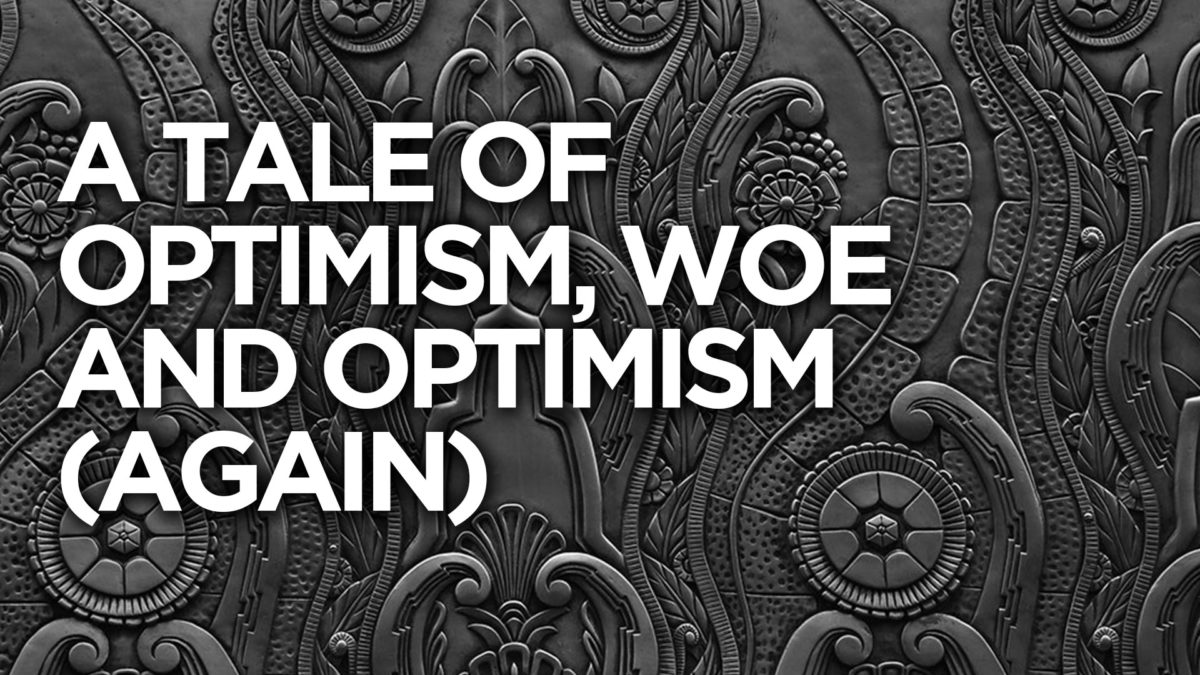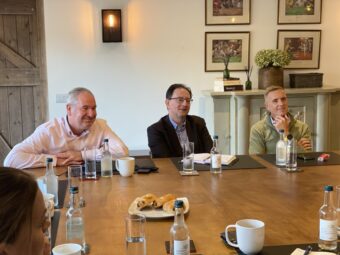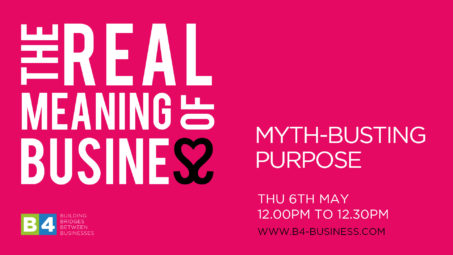
A tale of optimism, woe and optimism (again)
Back in 1998/99 I had worked out that the way an organisation or business CONDUCTED itself was the central driving outcome for business and brand strategic thinking. I’d even given my thoughts a name – uncreatively, I called it CONDUCT.
I was already 17 years into my career and the question ‘WHY?’ – and the resulting answers to this – had been central to it the whole time. ‘WHY?’ had been central to my conceptual thinking studies at Art School, where I was surrounded by some of the most questioning and challenging people imaginable. Hell, WHY? was why I went to Art School in the first place as a disaffected punk teenager with a curious, enquiring mind. WHY was central to my early career as a concept creative and it was absolutely central to my transition to strategy.
“Back to the late 90’s. In my mind and work, the answers to the questions ‘why do we exist?’, ‘What purpose should we serve?’, ‘what will people think of us?’ and ‘how will we conduct ourselves?’ were central to defining business conduct.”
Back to the late 90’s. In my mind and work, the answers to the questions ‘why do we exist?’, ‘What purpose should we serve?’, ‘what will people think of us?’ and ‘how will we conduct ourselves?’ were central to defining business conduct. I wasn’t convinced that culture or values were the outcomes back then (or now). Conduct was the manifest, visible, real set of linked strategic actions we take – not just words and ideals. Conduct was real business, real change, real progress and improvement, not fluff.
By 2001, I had built CONDUCT as my methodology. It showed the linkages between strategy and tactics, cause and effect, vision and outcomes, current state to change state to future state engineering, strategic alignment etc, across all the interconnections, interactions and, critically, interdependencies, between each and all parts of business – from governance in the boardroom to product/service development, to operation, talent development, strategic partnerships and relations, M&A activity and everything else within every part of a business AND every way that the outside world thought about that business. Ultimately, conduct was about what we now call purpose but also, unashamedly, about profit.
Conduct provided all the indicators leadership needed to make real and informed choices about how their organisations should develop. It pre-dated ESG and it was pretty much at the beginning of CSR. I used words like vision, purpose, mission, value, alignment… but the word I used most was WHY.
“I used words like vision, purpose, mission, value, alignment… but the word I used most was WHY.”
When I was allowed in, CONDUCT applied in business was never easy. If you keep asking C-Suite people ‘WHY?’ enough times, getting ever deeper into the mechanisms of their minds, influences (usually shareholders) and businesses, the conversations start out very difficult but, ultimately, get easier and become very rewarding. When you get past the veneer of CEO/business speak and in to truthful, human language, magic starts to happen.
So far so good, but there was a massive problem. I aligned my methodology to BRAND strategy. I naively thought that other people would understand that brand was what I thought it was – the central, defining, strategic indicator for absolutely everything an organisation chose (and it is ALL about choice) to do now and in it’s future – its conduct.
“In this I was wrong. I spent the next 10 years trying to fight the good fight for BRAND STRATEGY as I saw it but the world saw Brand in very different ways.”
In this I was wrong. I spent the next 10 years trying to fight the good fight for BRAND STRATEGY as I saw it but the world saw Brand in very different ways. In the end, I gave up and dropped the ‘B’ word completely. I gave up calling myself a Brand Strategist and just called myself a Strategist. I changed ‘CONDUCT’ to ‘FUTURE CONDUCT’ minus the ‘brand’ element – and that is MY current state today.
I should have dropped the word ‘brand’ earlier and just talked about ‘conduct’ – my bad. It would have saved a lot of time trying to argue why I shouldn’t be directed to a CMO or marketing leader!
The consequence of all this was that while I was embroiled in fighting for right thinking about brand, others were changing the game.
Simon Sinek introduced ‘WHY?’ as a principled methodology in its own right and changed business thinking forever. Others who had nothing to do with brand were starting to build PURPOSE as not only a true business strategic discipline but, more recently, as the driver for systemic change in the way we think about business and its place in the world.
PURPOSE-LED business, business as a force for good and step change in thinking about stakeholder value are absolutely relevant and absolutely right. ESG is dominant in our thinking now and the rise in ESG measurement and its direct impact on profit abound. Most importantly, the world (and the people in it) has changed profoundly – ironically, there is a citizen-led rallying cry for business to conduct itself very differently from now on.
“PURPOSE-LED business, business as a force for good and step change in thinking about stakeholder value are absolutely relevant and absolutely right.”
So, here I am, fully immersed in all this, still believing that CONDUCT is everything, slightly crying into my beer about missed opportunities and occasionally moaning about how I was once ahead of the curve but now just part of the gang. I can accept this – it is my cross to bear.
What I can’t stand though is the idea that anyone would think I’m just jumping on a bandwagon or that I’m not ‘authentic’. I don’t want to be defensive but…
“The difference now is that the world has not only caught up but has recognised that these things are more important than ever.”
For me, the questions ‘Why do we exist’ and ‘How will we conduct ourselves?’ are as relevant as they were when I first created BRAND/FUTURE CONDUCT in 1998. The difference now is that the world has not only caught up but has recognised that these things are more important than ever. If the world has overtaken me I’m thrilled because the aims behind conduct are being met.
Now, the weight of evidence and forensic, wide debate about all this is huge – and in the mainstream of business thinking and strategic development. 35 years into my career, I finally have hope; and my excitement about the possibilities for FUTURE CONDUCT, it’s contribution to business and society significantly outweigh my regrets about having missed some boats in the past.
My days of working with clients are almost over. I leave this to those with the energy and punk spirit to drive this thinking into actual business conduct. I applaud you all from the touchlines as I spend my time closing the gaps between business, government and the civil society. My new home is my co-founded Age of Human business community and my new single-minded focus is how to build better compelling coalitions for change. More on that another time.
More in Community Building

A Growing Desire for Better Business
The Better Business Ecosystem is raising awareness and showcasing the wide variety of ways businesses can have a more positive impact on society, communities and the environment, by embedding great business practices across their companies.

Why joining a community of business leaders can enhance your reputation and credibility
I read a LinkedIn post recently that reassured business owners that if they’d managed to keep their businesses going during recession, Brexit, COVID and the cost-of-living crisis that they deserved a huge pat on the back and shouldn’t ‘beat themselves up’. Easier said than done when costs are rising and doing business seems to get harder rather than easier, but the sentiment was well-placed.

Why it’s important for Business Leaders to be exposed to new...
Nobody likes a ‘know it all’ and let’s face it, there’s no such thing. At the other end of the scale, many of us don’t create enough time to take on board new ideas, innovation and creativity in whatever format. How many times have you been recommended to read a book, get sent the link, go on Amazon, maybe even buy it but it just sits on your bookshelf? Come to think of it, as an aside, just think about that for a second….I wonder what the actual percentage of books purchased are actually read? Frightening thought!
From this author

Myth-Busting Purpose
In this episode of The Real Meaning of Business, Sam Kandiyali and Steve Cook are joined by Andy Green as they tackle some of the myths surrounding purpose and meaning in business.

Myth-Busting Purpose
In this episode of The Real Meaning of Business, Sam Kandiyali and Steve Cook are joined by Andy Green as they tackle some of the myths surrounding purpose and meaning in business.

The noble art of selling
No matter whether I’ve been studying conceptual and critical thinking or working with global tech enterprises, or with relatively simple businesses, or with organisations dealing with profound social challenges, or with the institutions that claim to represent us in Government, Education, Healthcare provision and Justice, or with those that want to find better ways for us to work and live and interact with each other, or in my work with movements and coalitions for change who are looking at massive subjects like climate change, the future of business, work, consumerism, capitalism, democracy or even society itself, I keep coming back to the same two basic concepts

